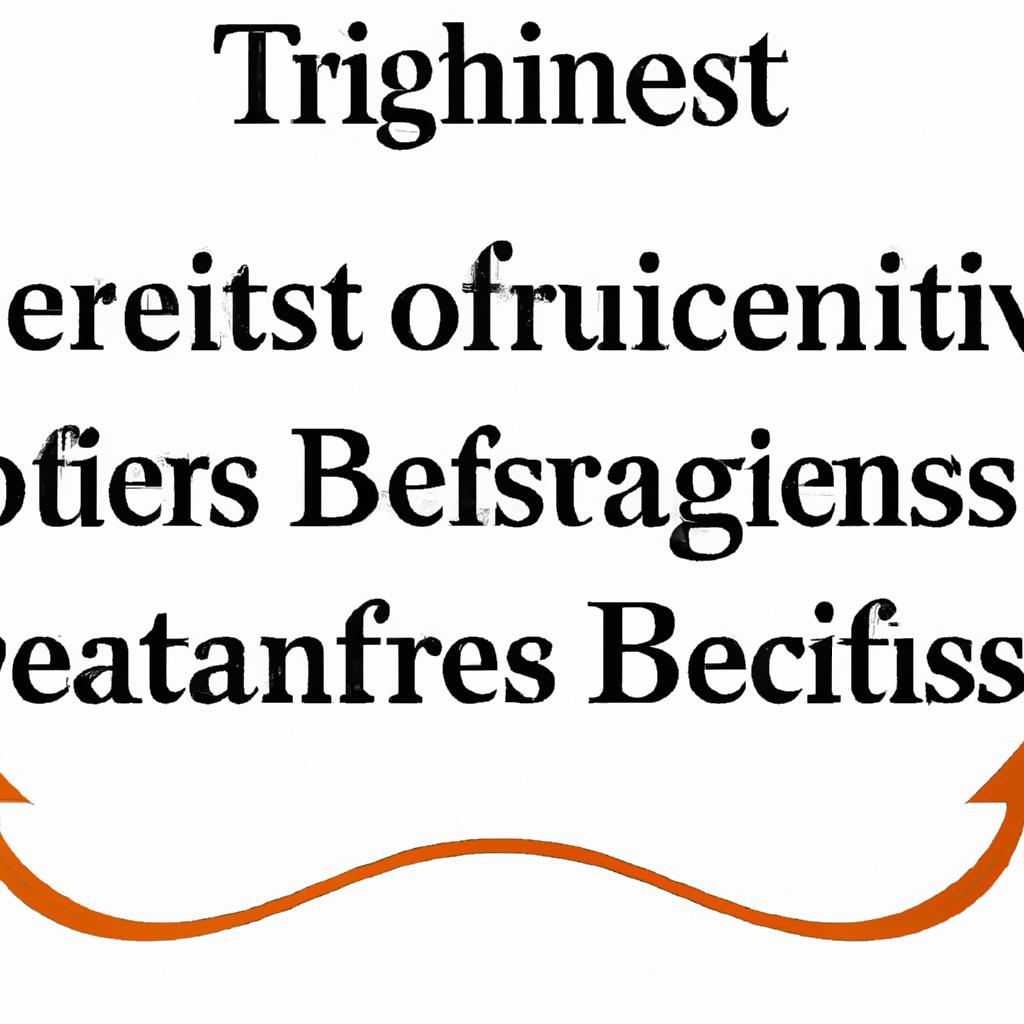In the realm of estate planning, a longstanding debate persists: is trust truly better than inheritance? As experienced attorneys at Morgan Legal Group, we understand the intricate nuances of crafting a comprehensive estate plan tailored to our clients’ unique needs. From navigating the complexities of probate to establishing trust structures that provide long-term benefits, we are committed to helping individuals make informed decisions about the distribution of their assets. Join us as we delve into the considerations surrounding trust versus inheritance and explore the potential advantages and pitfalls of each approach.
Why Trusts May Outweigh Inheritance in Estate Planning Strategies
When it comes to estate planning strategies, trusts can often outweigh traditional inheritance methods. While inheritance may seem like a straightforward way to pass on assets to loved ones, trusts offer a level of control and protection that can be invaluable. Trusts allow individuals to specify how and when their assets are distributed, ensuring that their wishes are carried out even after they are gone.
Unlike inheritance, trusts can also provide privacy and protection from creditors and legal challenges. With a trust, assets are held separately from the individual’s estate, making them less vulnerable to claims. Additionally, trusts can help minimize estate taxes and ensure a smooth transition of assets to beneficiaries. By carefully considering the use of trusts in estate planning, individuals can establish a comprehensive and secure plan for the future.

Key Differences Between Trusts and Inheritance in Wealth Transfer
When it comes to wealth transfer, one of the key aspects to consider is whether to choose a trust or inheritance. While both options have their advantages and disadvantages, it is important to understand the key differences between them to make an informed decision. Trusts and inheritance have distinct features that can significantly impact how your assets are distributed and managed after your passing.
One of the main differences between trusts and inheritance is control. With a trust, you have the ability to specify how and when your assets are distributed to your beneficiaries. On the other hand, inheritance typically involves passing on assets directly to your heirs, who then have full control over them. Another important distinction is privacy. Trusts offer a higher level of privacy as the details of the trust agreement are not made public, while inheritance through a will involves a public probate process that exposes your assets and beneficiaries to scrutiny.

Benefits of Establishing Trusts Over Relying Solely on Inheritance
Control Over Assets:
- With trusts, you can dictate when and how your beneficiaries receive their inheritance, allowing you to protect your assets from being squandered or mismanaged.
- Trusts also provide the flexibility to include conditions that must be met before distributions are made, ensuring that your assets are used in a manner consistent with your wishes.
| Trusts | Inheritance |
|---|---|
| Allows for asset protection and management | Assets may be susceptible to creditors or mismanagement |
| Offers flexibility in distribution terms | Distributions are typically made outright |
Tax Benefits:
- Trusts can help minimize estate taxes and avoid probate, ensuring that more of your assets are passed on to your beneficiaries.
- Additionally, certain types of trusts, such as irrevocable life insurance trusts, can provide tax advantages that may not be available with a traditional inheritance.

Strategic Recommendations for Incorporating Trusts in Estate Plans
Incorporating trusts into estate plans can provide numerous benefits compared to traditional inheritance methods. Trusts offer a way to manage and distribute assets in a more controlled and efficient manner, while also allowing for customization based on individual needs and preferences. By setting up a trust, individuals can ensure that their assets are protected and passed on to their chosen beneficiaries in a way that aligns with their specific wishes.
One key strategic recommendation for incorporating trusts in estate plans is to carefully consider the different types of trusts available and choose the one that best suits your needs. Whether it’s a revocable trust, irrevocable trust, living trust, or testamentary trust, each type has its unique advantages and considerations. Additionally, working with a knowledgeable estate planning attorney, such as Morgan Legal Group in New York City, can help navigate the complexities of trusts and ensure that your estate plan is set up in a way that maximizes benefits while minimizing risks.
Q&A
Q: Is trust better than inheritance?
A: That depends on your personal circumstances and priorities.
Q: What are the benefits of a trust over inheritance?
A: Trusts offer more control over the distribution of assets, can help minimize estate taxes, and provide added protection against creditors and lawsuits.
Q: Are there any downsides to using a trust instead of inheritance?
A: Trusts can be more expensive to set up and maintain, and they may require more ongoing management than a simple inheritance plan.
Q: How does trust avoid family conflicts?
A: A trust can outline specific instructions for how assets are to be distributed, reducing the potential for misunderstandings or disputes among family members.
Q: Can trusts provide more privacy than inheritance?
A: Yes, trusts are generally more private than the probate process required for inheritance, as they do not become part of the public record.
Q: What factors should be considered when deciding between trust and inheritance?
A: It’s important to consider your financial goals, family dynamics, and the complexity of your estate when determining whether a trust or inheritance plan is more suitable for your needs.
Wrapping Up
In conclusion, the question of whether trust is better than inheritance is a complex and nuanced one. While inheritance may provide a sense of security and familiarity, trust offers flexibility, control, and the opportunity for growth and innovation. Ultimately, the decision will depend on individual circumstances and values. Trust in the process of decision-making and communication may be the key to finding the right balance between tradition and progress. Embracing trust as a guiding principle can lead to a more open and fulfilling relationship between generations, ensuring that both legacies and opportunities are passed on with care and intention. Trust or inheritance? Perhaps the answer lies in finding a harmonious blend of both.
 Is trust better than inheritance?
Is trust better than inheritance?
The concept of inheritance has been ingrained in our society for centuries. It is the idea of passing down wealth, property, and assets to future generations. It is often seen as a way to provide financial security and stability for loved ones after we are gone. However, there is another option that is gaining popularity: trust. It offers similar benefits to inheritance, but with added flexibility and control. In this article, we will explore the differences between trust and inheritance and discuss why trust may be a better option for many individuals.
Understanding Trust and Inheritance
Before delving into the details, it is essential to understand the basics of trust and inheritance. A trust is a legal arrangement where a trustee holds and manages assets on behalf of a beneficiary. It can be set up by an individual or a family to manage their assets and allocate them to beneficiaries according to their wishes.
On the other hand, inheritance is the process of passing on assets and property to beneficiaries after the owner’s death. It can be done through a will or laws of intestacy (when someone dies without a will). The assets and property are typically distributed after the probate process, which can take several months to a year to complete.
Advantages and Disadvantages of Trust and Inheritance
Both trust and inheritance offer various benefits and drawbacks. Understanding these can help you make an informed decision about which option is best for you and your family. Let’s take a closer look at the advantages and disadvantages of trust and inheritance.
Trust Advantages:
1. Flexibility: Trusts offer more flexibility than inheritance. You can choose when and how your assets are distributed to your beneficiaries. This can be particularly beneficial for families with minors or individuals with disabilities who may need financial support beyond their childhood years.
2. Privacy: Trusts offer more privacy than inheritance. As mentioned earlier, inheritance goes through the probate process, which can be a public and lengthy procedure. In contrast, trusts are not subject to probate, and the details of the trust remain confidential.
3. Asset Protection: Trusts can offer asset protection by shielding assets from creditors or potential legal claims. This is especially beneficial for individuals who have a high net worth or heirs who may be in precarious financial situations.
4. Control: By setting up a trust, you retain control over your assets even after your death. You can outline detailed instructions on how your assets should be managed and distributed, ensuring that your wishes are followed.
Trust Disadvantages:
1. Cost: Setting up a trust can be more expensive than creating a will. It may involve legal fees and ongoing administrative costs, such as trustee fees. Some trusts may also be subject to taxes on income and capital gains, depending on the trust’s structure and location.
2. Complexity: Trusts can be more complicated than inheritance, as they involve creating a legal document and selecting a trustee to manage and distribute the assets. This requires careful consideration and potentially working with a lawyer or financial advisor, which can be overwhelming for some individuals.
Inheritance Advantages:
1. Simplicity: Inheritance only involves creating a will or naming beneficiaries for your assets, which can be a simple and straightforward process. It does not require extensive legal work or choosing a trustee.
2. Lower Cost: Creating a will and going through the probate process is generally less expensive than setting up a trust. This can be an attractive option for individuals who do not have many assets to distribute or who have limited financial resources.
Inheritance Disadvantages:
1. Lack of Control: With inheritance, once the assets are distributed, the beneficiaries have full control over them. This can be an issue if beneficiaries are minors, irresponsible, or in an unstable financial situation.
2. Limited Flexibility: Once a will is written, it cannot be changed or amended. This can be problematic if there are significant changes in your life or if you wish to add new beneficiaries.
Why Trust may be a Better Option
After exploring the advantages and disadvantages of both trust and inheritance, it is clear that trust may be a better option for many individuals. It offers more control, flexibility, and privacy, which can be crucial when planning for the future. Here are some other reasons why trust may be a better option:
1. Managing Complex Family Dynamics: Trusts can be beneficial for families with complex family dynamics, such as blended families or individuals with multiple marriages. Trusts can ensure that your assets are distributed according to your wishes and avoid potential disputes.
2. Protecting Assets: Trusts can protect your assets from various potential risks, such as lawsuits, divorce, or bankruptcy. This can offer peace of mind, especially if you have significant assets that you want to pass down to your loved ones.
3. Avoiding Probate: One significant advantage of trust is that it avoids the lengthy and public probate process. This can save your beneficiaries time, money, and the hassle of going through a court process.
Tips for Setting Up a Trust
If you are considering setting up a trust, here are some tips to keep in mind:
1. Work with Professionals: Setting up a trust can be complicated, and it is crucial to work with professionals such as lawyers, financial advisors, and accountants to ensure that everything is done correctly.
2. Consider Your Goals and Needs: Before setting up a trust, think carefully about your family’s unique situation and your long-term goals. This can help you create a trust that aligns with your values and adequately supports your loved ones.
3. Review Your Trust Regularly: As life changes, it is essential to review and update your trust regularly to ensure that it reflects your current wishes. This can help avoid potential issues and ensure that your trust is up to date.
Conclusion
In conclusion, trust and inheritance both have their advantages and disadvantages, and the better option may vary depending on an individual’s circumstances. However, for many individuals, trust offers more flexibility, control, and privacy, making it a preferable option. If you are considering setting up a trust, be sure to work with professionals, consider your goals and needs, and regularly review and update your trust to ensure its effectiveness.

